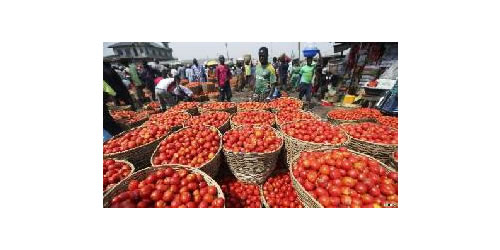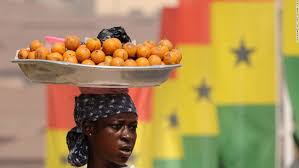How Ghanaian cassava farmers are saved by a beer

Ghanaians are embracing the use of locally produced raw materials even though it is seen as inadequate.
Ghana produces food crops in abundance and in their raw state, these food items often go waste due to lack of ready market for consumption. This is the case with cassava, Ghana’s most highly produced crop and a staple of the Ghanaian consumer diet.
Ghana is said to be the 6th largest producer of cassava in the world in terms of value, with the commodity constituting 22% of the country’s Gross Domestic Product (GDP), according to a Country Case Study of Cassava Development in Ghana prepared by the Ministry of Food and Agriculture (MoFA) and published by United Nations Food and Agriculture Organization (FAO) in 2005.
According to the FAO, about 50% of cassava produced in the country is lost along the value chain despite an annual production growth of 6% over the past six years.
While the crop is cultivated in large enough volumes to produce an annual surplus of over 5 million metric tons, its commercialization is said to be significantly limited by rapid spoilage upon harvest and a lack of processing capacity close to production areas.
Cassava is most commonly consumed as Gari – fermented and ground into granules similar to fine couscous – or pounded into a mashed potato-like consistency as Fufu – eaten with soups or sauces.
The crop is now slowly shedding its image as a “poor man’s crop” or a “home crop” to a business venture crop for farmers. Some experts in the agricultural sector are tipping it as a game changer crop for many local farmers. This is because of the ready market platform provided by some multinational brewery firms like Diageo Plc with its Ghanaian subsidiary Guinness Ghana Breweries Limited (GGBL). Businesses are now attracted to cassava, thus the sharp rise in price of the crop; therefore an attractive proposition for farmers.
In December 2012, following the introduction by the Ghanaian government of tax rates that promote the use of local raw material inputs, GGBL created Ruut Extra Premium Beer – a well-balanced, premium clear beer based on cassava.
Through technological developments and close collaboration with the farming community, GGBL was able to bring to market Ghana’s first commercial cassava beer at a price affordable for a broader number of Ghanaian consumers.
This is Diageo’s first beer brewed using cassava and also holds the Diageo record for speed of development: eight weeks from concept to commercialization. Its introduction was made possible due to the Ghanaian government’s progressive policy on local raw materials, which has resulted in concessions on products containing a majority of local ingredients. This innovation also supports Diageo’s ambition to increase local sourcing in Africa, helping support agricultural development and benefiting local smallholder farming communities.
According to the Agric Sector Annual Progress Report 2013 published by the Ministry of Food and Agriculture (MoFA), the introduction of the beer has provided ready market to cassava farmers. This is partly responsible for the general increase in the area put under cassava production.
The MoFA report indicated that as of 2013, GGBL has purchased more than 3,500 metric tons of cassava from local famers mainly in Atebubu (Brong Ahafo Region), Ho (Volta Region), Nkwanta (Volta Region) and Suhum (Eastern Region).
The report noted that a total 4,741 metric tonnes of cassava purchased for beer brewing in Ghana, GGBL buys over 74% of them.
The opportunity to make beer by using cassava in Ghana is unique, perfectly fitting into the 2014 Farmers Day theme “Eat What We Grow”. Cassava farmers over the years have complained that after harvest, they are unable find buyers and majority of the crop goes bad. For this reason most farmers gave up cultivating cassava.
“But now we are very happy with the introduction of Ghana’s first beer Ruut Extra many are now cultivating more cassava,” James Akwetey Moore, farmer based in Suhum said. During the main crop season, farmers now cultivate about 100 to 150 acres of cassava and sell it to factories such as the Ayensu Starch Factory which the government has partnered GGBL to operate.
“First and foremost, having a local supply chain that is resilient is important to the business. Furthermore, you do not have to spend huge amount of foreign exchange to import raw materials. The benefits of local sourcing for the community are extremely obvious. To be connected as a farmer to a business like Guinness Ghana is absolutely important,” said Kweku Sekyi- Cann, Marketing Director of Guinness Ghana Breweries Limited.
According to the beverage company, it is committed to developing its local procurement in partnership with the government and the local smallholder farming community to provide economic opportunity within the agricultural sector while creating great products for the Ghanaian consumer.
About 75% of consumers in Africa exist on about $4 a day, a situation that a consumer insight revealed and that led to the Ruut Extra project. It was to deliver quality product at a price the consumer can afford.
Combined with the knowledge in production and using local material to do something that is refreshingly unique to the Ghanaian people, the Ruut Extra project, according to officials was delivered in record time from idea to market within weeks.
GGBL’s intention was to significantly expand the use of locally sourced materials. “We have developed programs to support farmers and we intend to invest in this program in further support of stakeholders including government,” said Sekyi-Cann.
GGBL approaches its agricultural supply chain knowing that the future prosperity of farmers, suppliers and the business is closely linked with the ability to create partnerships and generate joint business value in ways that are sustainable, secure, and mutually beneficial.
The company supports sustainable sourcing and, where appropriate, local sourcing of raw materials which meet their quality standards. Increasingly, it is looks at alternative raw materials which are more resilient and better adapted to their local climates.
Source: myjoyonline





